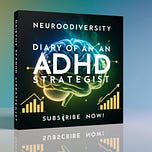The Morning Battle
Jamie stared at the computer screen, leg bouncing frantically under the desk. Another deadline loomed, but focus remained frustratingly out of reach.
The familiar battle was playing out again: important task versus a brain that seemed wired to notice everything except the work at hand. Concentration scattered like leaves in a strong wind.
After 20 minutes of struggle, Jamie made a decision. Instead of forcing the issue, it was time for a quick jog around the block.
Fifteen minutes later, returning with slightly damp hair and quickened breath, Jamie sat down and found the words beginning to flow with ease. The brief burst of movement had accomplished what willpower alone could not do.
..but focus remained frustratingly out of reach
Breaking It Down: What's This All About?
ADHD (Attention-Deficit/Hyperactivity Disorder) is a neurodevelopmental condition characterized by persistent patterns of inattention, hyperactivity, and impulsivity that interfere with functioning and affect daily life. Exercise, on the other hand, is any physical activity that enhances or maintains physical fitness and overall health and wellness.
The fascinating intersection between these two—exercise as a powerful intervention for ADHD symptoms—offers hope and practical strategies for the millions who live with ADHD.
Why This Matters
For the estimated 366 million adults worldwide with ADHD, finding effective management strategies extends far beyond productivity—it impacts relationships, career advancement, self-esteem, and overall life satisfaction. Traditional approaches often center on medication and behavioral therapy, yet many seek complementary strategies that offer additional benefits without unwanted side effects.
Exercise represents one of the most accessible, affordable, and effective complementary approaches to ADHD management, offering benefits that extend beyond symptom control to overall health and emotional well-being. Whether you're personally managing ADHD or supporting someone who is, understanding this connection provides a powerful tool for your toolkit.
it impacts relationships, career advancement, self-esteem, and overall life satisfaction
The Science Behind It
The relationship between exercise and improved brain function is well-established, but research specifically examining exercise's impact on ADHD reveals particularly compelling neurological benefits.
A meta-analysis published in the Journal of Attention Disorders found that acute exercise has a significant positive effect on attention, hyperactivity, impulsivity, anxiety, and executive function in children with ADHD and adults.
Exercise triggers the release of neurotransmitters including dopamine and norepinephrine, the exact chemicals targeted by ADHD medications—helping to regulate attention and improve mood. Dr. John Ratey, associate clinical professor of psychiatry at Harvard Medical School, describes exercise as "like taking a little bit of Prozac and a little bit of Ritalin combined."
Research from the University of Georgia demonstrated that just 20 minutes of moderate-intensity exercise improved neurocognitive function and inhibitory control in children with ADHD, effects that lasted for up to 40 minutes. For adults, a study in the journal Frontiers found that regular aerobic exercise for 6 weeks significantly reduced ADHD symptoms and improved executive function.
Perhaps most importantly, research from the University of Illinois found that regular physical activity may help children and adults with ADHD maintain focus and improve academic or work performance over the long-term.
Making It Work: How to Apply This in Real Life
Transforming these research insights into practical habits doesn't require expensive equipment or complicated routines. Here's how to integrate exercise effectively into an ADHD management strategy that works:
✅ Start Small – Begin with just 10-15 minutes daily. Even brief exercise periods provide cognitive benefits, and starting small promotes consistent follow-through.
✅ Find Joy First – Choose activities you genuinely enjoy. ADHD brains thrive on interest and novelty, making enjoyment crucial for lasting habits.
✅ Morning Momentum – Exercise early when possible. Morning activity sets a neurochemical foundation that can improve focus for several hours afterward.
✅ Break It Up – Scatter mini-movement breaks throughout your day. A 5-minute walk or quick set of jumping jacks can "reset" focus during long work periods.
✅ Harness Hyperactivity – Channel physical restlessness into intentional movement. Standing desks, fidget-friendly workouts, or bouncing on exercise balls can transform distracting energy into productive action.
✅ Pair with Focus – Combine exercise with tasks requiring attention. Walking meetings, audiobooks during workouts, or stationary bikes while reading can multiply the benefits.
✅ Track Your Response – Note which exercises and durations most effectively impact your symptoms. This personalized data helps optimize your approach.
Real-Life Examples in Action
The Executive's Solution
Michael, a marketing executive with ADHD, struggled with sitting through lengthy meetings. After disclosing his condition to his understanding team, he implemented "walking meetings" for one-on-one discussions. "Not only has this improved my focus during conversations, but my colleagues have noticed better creative thinking when we're in motion too."
The Student's Strategy
College student Amara found studying for exams nearly impossible until she developed a routine of 20-minute study blocks separated by 5-minute exercise intervals. "I do jumping jacks, dance to one song, or run up and down the stairs. When I return to studying, it's like my brain has been completely refreshed."
The Remote Worker's Rhythm
Terry, a software developer working remotely, programmed fitness reminders into his workday. "I do pushups before difficult coding tasks and yoga when I notice my attention wandering. My productivity metrics have improved 30% since implementing these movement microbreaks."
Pro Tips & Insider Insights
🔍 Synchronize with Medication – If you take ADHD medication, timing exercise to align with medication peaks or valleys can maximize the combined effect.
🧠 Embrace the Outdoors – Nature exposure combined with exercise provides additional cognitive benefits. Research shows "green exercise" may be particularly effective for ADHD symptom management.
⏰ Emergency Intervention – Keep a list of quick 3-minute exercises for moments when focus completely derails. These serve as "rescue strategies" during important tasks.
🌊 Consider Water – Swimming and water-based exercises provide proprioceptive feedback that can be especially calming and focusing for people with ADHD.
Quick Cheat Sheet (Summary of Key Takeaways)
🔹 Even brief exercise (10-20 minutes) immediately boosts focus-related neurotransmitters for several hours.
🔹 Morning exercise creates a neurochemical foundation that supports attention throughout the entire day.
🔹 Consistency matters more than intensity—regular moderate exercise outperforms occasional intense workouts.
🔹 Exercise is most effective for ADHD when it's enjoyable and matches your natural energy and interest level.
🔹 Strategic movement breaks during focused work prevent attention drift and maintain productive momentum.
Further Reading (Books & Resources)
📖 Spark: The Revolutionary New Science of Exercise and the Brain by John J. Ratey – Essential reading on exercise's neurological impacts on ADHD.
📖 The ADHD Effect on Marriage by Melissa Orlov – Includes strategies for incorporating exercise into family dynamics.
📖 Driven to Distraction by Edward M. Hallowell and John J. Ratey – Classic ADHD resource with updated sections on exercise.
Practical Tools & Apps
🔧 Fitbod – Personalized workout plans that adapt to your feedback, ideal for maintaining novelty and interest.
🔧 Pomodoro Timer – Customizable work/break timer perfect for scheduling movement breaks between focus sessions.
🔧 Down Dog – Generates new yoga routines each time, preventing the boredom that often derails ADHD exercise habits.
🔧 Zombies, Run! – Story-driven running app that adds narrative engagement to cardio workouts.
Research & Studies Section (Citations & Sources)
Cerrillo-Urbina, A. J., García-Hermoso, A., Sánchez-López, M., Pardo-Guijarro, M. J., Santos Gómez, J. L., & Martínez-Vizcaíno, V. (2015). The effects of physical exercise in children with attention deficit hyperactivity disorder: A systematic review and meta-analysis of randomized control trials. Child: Care, Health and Development, 41(6), 779-788.
Pontifex, M. B., Saliba, B. J., Raine, L. B., Picchietti, D. L., & Hillman, C. H. (2013). Exercise improves behavioral, neurocognitive, and scholastic performance in children with attention-deficit/hyperactivity disorder. The Journal of Pediatrics, 162(3), 543-551.
Mehren, A., Reichert, M., Coghill, D., Müller, H. H. O., Braun, N., & Philipsen, A. (2020). Physical exercise in attention deficit hyperactivity disorder – evidence and implications for the treatment of borderline personality disorder. Borderline Personality Disorder and Emotion Dysregulation, 7, 1.
Cornelius, C., Fedewa, A. L., & Ahn, S. (2017). The effect of physical activity on children with ADHD: A quantitative review of the literature. Journal of Applied School Psychology, 33(2), 136-170.
Vysniauske, R., Verburgh, L., Oosterlaan, J., & Molendijk, M. L. (2020). The effects of physical exercise on functional outcomes in the treatment of ADHD: A meta-analysis. Journal of Attention Disorders, 24(5), 644-654.
Call-to-Action & External Link
Don't let this knowledge remain just information—commit to integrating movement into your daily routine and observe the changes in your focus, mood, and productivity. Start with just 10 minutes tomorrow morning and build from there gradually.
Remember that consistency matters more than perfection. When you inevitably miss a day, simply return to your routine without judgment. Your brain needs this movement to function at its very best.
🎧 For more insights, check out Diary of a ADHD Strategy podcast:

















Share this post